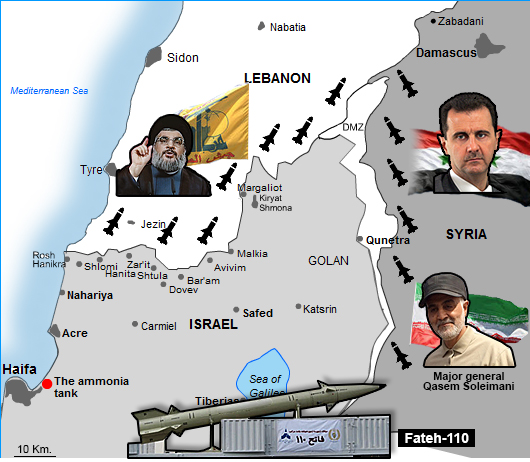Assad Will Let Hizballah Fire Rockets against Israel from Syrian Soil
An outpouring of anti-Israel bluster from the Hizballah chief Hassan Nasrallah in the past week raised questions about what he is up to. Monday, he advised Israel to “count up to a million” before thinking of attacking his organization in Lebanon. Last week, he threatened his rockets would hit the nuclear center at Dimona and the giant ammonium tanks in Haifa Bay, causing an environmental disaster that could leave tens of thousands of casualties.
Both threats are pretty hollow. Israel’s nuclear reactor has long been well protected deep underground and the ammonia tank is guarded by air defense systems. In the 2006 war, it was emptied out so as not to jeopardize the population of Israel’s third city.
So what galvanized the Hizballah chief into his new outbreak of saber-rattling, when more than half of his fighting strength of around 10,000 men is pinned down fighting on Bashar Assad’s frontlines, an intervention that has cost his followers some 2,000 dead?
Nasrallah is spurred by two hitherto hidden developments:
1. DEBKA Weekly’s intelligence sources report exclusively on a conversation between the Hizballah leader and the Syrian ruler in early February. After heavy arm-twisting by Tehran, Assad consented to Syria taking part in any future outbreak of war between the Lebanese Shiite terrorist group and Israel. He agreed that the Syrian army would undertake missile strikes against targets on the lists submitted by Hizballah. Nasrallah’s army would moreover be permitted to fire rockets against Israel from its bases in Syria, especially the Qalamoun Mountains that lie between Syria and Lebanon.
Any war against Israel would therefore be waged from both Lebanon and Syria – a development that DEBKA Weekly forecast from the moment that Hizballah intervened in the Syria civil war alongside Assad’s army.
It is hard to see the badly battered Syrian army taking on additional wars. Most of its units are hardly fit to take on rebel forces, and some are so reduced by heavy casualties that they only exist on paper. Nonetheless, the Syrian ruler’s commitment gave Nasrallah’s self-confidence a huge boost.
2. The Hizballah, Iranian and Syrian high commands and leaders are well aware of US President Donald Trump’s drive to remove their troops and proxies, Hizballah and the Shiite militias, from Syria. Assad’s promise to Nasrallah has supplied Iran’s supreme commander in Syria and Iraq, Gen. Qassem Soleimani, and the Hizballah’s chief with the pretext for keeping their forces in place to defend both Syria and Lebanon against the Zionist menace.
Israel is not overly troubled by Nasrallah’s saber-rattling, but is nonetheless taking the precaution of a military build-up along its borders with Syria and Lebanon.
The freeze on Trump’s understandings with Vladimir Putin for US-Russian strategic cooperation in Syria has left a void. Since there is no knowing what will happen next, Assad and Nasrallah are taking matters in their own hands, and deciding what makes most political and military sense to their interests. They may decide it suits their book to suddenly provoke hostilities with Israel. They have done this in the past. This is what Nasrallah did in 2006 when he ordered a cross-border operation to snatch and kill Israeli troops patrolling the border. He is capable of repeating this exercise in 2017 too.
And so, Wednesday, Feb. 22, “Arab sources” discovered an Israeli air strike over Damascus that morning, but could not decide how it happened: One reported a pair of Israeli warplanes conducting sorties above Damascus; another, Israeli drones “operating from Lebanon.” Both described a large fire west of Damascus which set off secondary explosions for more than an hour, indicating that a munitions store was struck.
A hidden hand was already at work to involve the Syrian army in combat with Israel.


